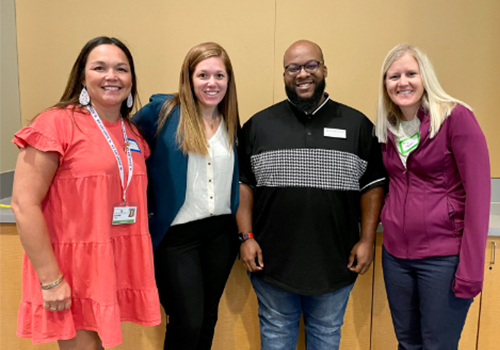Case Study | Training
Missouri College and Career Attainment Network

Cherelle Washington
Director, College Access and Career Readiness
The Missouri College and Career Attainment Network (MOCAN) was formed in 2022 to ensure that “students who could most benefit from education beyond high school have what they need to earn a credential leading to a rewarding career.” The network is focused on addressing the three biggest barriers students face: access, affordability, and completion. MOCAN provides professional development on all aspects of college and career advising, engaging 44 percent of Missouri high school counselors.
Preparing Students for a Fulfilling Career
MOCAN’s work concentrates on Black, Indigenous, Latinx, and People of Color students, students from low-income backgrounds, those from rural communities, and adult learners. MOCAN has “the very ambitious goal of transforming the post-secondary educational system to help all students realize a fulfilling career,” says Cherelle Washington, director, College Access and Career Readiness at MOCAN. “We believe that students should graduate twice—from high school and another program that yields a career-opening certificate or diploma—and we are committed to helping everyone, especially our target populations, achieve these goals.”
MOCAN’s professional development program expanded significantly during COVID, says Cherelle. “We had been providing in-person training to counselors in the St. Louis region, but when COVID hit, MOCAN decided to move our training online and focus on counselors across the state. uAspire had offered trainings before with MOCAN, and given their outstanding track record, they were the ideal partners for our online training.”
Making Progress in Rural Communities
To deepen its impact in rural areas, MOCAN partners with rootEd Alliance, a nonprofit working to help students in 135 rural schools plan their futures. "The rootEd advisers are playing an important role in rural schools,” says Cherelle, “but many of them didn’t know much about financial aid and few have comfort helping students complete the FAFSA. While uAspire’s trainings were offered to all counselors, we especially wanted rootEd advisers to have access to them. The trainings have really helped them to better assist their students and families.”
Delivering Tailored Trainings
In 2022 and 2023, uAspire delivered several trainings for MOCAN on the FAFSA and the College Scholarship Service (CSS) Profile. “uAspire really thinks about its audience and crafts presentations to meet their needs,” says Cherelle. “It is clear that they take feedback from counselors seriously and constantly adapt content and how they deliver it to best support counselors.”
Cherelle comments that uAspire trainers’ prior experience working as counselors and with students helps make the workshops relevant and actionable. “You can tell they are practitioners,” says Cherelle, “and I will listen to a practitioner any day over someone who does research. Their lived experience helps guide counselors in addressing specific questions they receive from students, many of whom have non-standard family circumstances.”
A participant in a recent CSS Profile training, working with a student applying to a highly selective school, told Cherelle that she never would have been able to help the student through the CSS Profile process without the training. "The family had an unusual situation,” says Cherelle, “and the counselor said she wouldn’t have had the confidence to support this student if she had not been in the workshop. The uAspire team does a great job of making the complex clear, and blending presentations with small assignments, which sends counselors away feeling like they can take this work on."
One hundred percent of those who participated in the uAspire trainings say the content was useful in their work with students and that they would recommend the trainings to others.

Changing the Postsecondary Narrative
Cherelle sees the professional development MOCAN and uAspire offer as helping to change the conversation about higher education. “Folks are not seeing the value of post-secondary education, and a lot of this has to do with costs,” says Cherelle. “My hope is that through education, we can help position college as a more attainable goal, which I hope will translate into a more educated Missouri. These trainings are playing a critical role in shifting the narrative.”